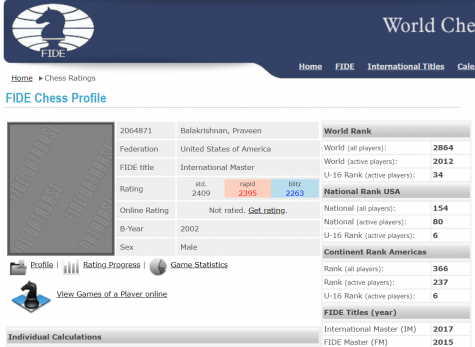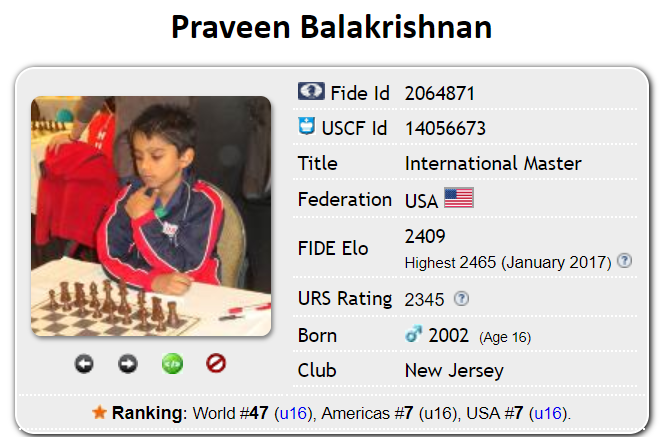International Master Praveen Balakrishnan on pursuing his passion for chess
Junior Praveen Balakrishnan’s profile on Chess-DB, a database of chess players. Although slightly dated, Balakrishnan’s prolific under-16 US and international rankings are shown.
October 23, 2018
Within all of us is a fire, a passion that fuels us to pursue greater heights in what we love. For junior Praveen Balakrishnan, that love is chess. Holding the title of International Master from the international chess federation FIDE, Balakrishnan has come a long way from when he first began playing chess at the age of 5.
“My neighbor lent me a chessboard, and originally I started playing with my parents,” Balakrishnan said. “As I slowly started to beat them, I became more interested, and I started playing online.”
He frequented the youth chess site www.chesskid.com, and eventually entered competitive chess in first grade. Amassing a 2-3 record at his first tournament, a state scholastic championship, Balakrishnan drew motivation to improve from the peers he saw there.
“I was just inspired by the people that got first place, that won five out of five,” Balakrishnan said. “I wanted to be like them.”
That drive, combined with a love for the game, helped Balakrishnan make the All-American Chess Team at age 8. He has only grown as a player since then, and is currently an International Master with a FIDE rating of 2400.

“I [had] been working a very long time to get that title. I got it two years back. When I got it, I was very happy,” Balakrishnan said. “Now my goal is to become a Grandmaster, improve one step further.”
However, as of now, Balakrishnan believes he still has a long way to go. He must beat enough strong players to increase his from 2400 to 2500, the minimum requirement to receive the title of Grandmaster. And he is yet to earn even one of the three norms needed to become a Grandmaster (GM), GM norms being a performance above Grandmaster level in certain 9-round tournaments.
One such tournament is just around the corner in mid-November.
“I’m going to play a tournament in St. Louis,” Balakrishnan said. “I’m trying to put a good performance there. I’m going to St. Louis to try to get a Grandmaster norm, because those are at stake.”
To practice for this and other tournaments, Balakrishnan uses websites such as Internet Chess Club. Despite the online medium, he plays against other people rather than against computers to best simulate real conditions. While Balakrishnan used to work with two Grandmaster coaches on specific aspects of his game such as opening and endgame techniques, the grueling Jefferson schedule means he simply doesn’t have the time anymore.
But Balakrishnan has found a way to work around the time constraints and still express his passion through Chess Club, held during 8th period. He describes club meetings as a fun way to get to know the other players better. A co-captain of the chess team, he continues to help improve the skills of fellow players.
“Last year, our team won the national tournament for the first time,” Balakrishnan said. “Our goal this year is to continue and keep on winning. As a club, we’re trying to improve and put our best foot forward.”
However, being a part of Jefferson’s chess team also comes with responsibility. Not only is chess club a time commitment, but playing as a part of a team can be different than playing individually.
“If you play a game individually in a tournament that’s not a team tournament, losing doesn’t feel so bad,” Balakrishnan said. “Of course it feels bad, but it’s not like you let your team down.”
Chess tournaments can be nerve-racking, especially with the added factor of time constraints. Having now competed in numerous tournaments around the world, Balakrishnan uses many mental strategies to deal with this pressure.
“During the game, I have to remember that it’s only a game, and that it’s not going to determine anything in your life,” Balakrishnan said. “When you realize that one game doesn’t change everything, you start to realize that there shouldn’t be as much pressure.”
One specific game, the one that earned him the title of International Master, stands out most vividly in his mind.
“In that game, I was playing a Grandmaster in the final round. I needed to win to get my final International Master norm, so I was under a lot of pressure,” Balakrishnan said. “Before the game, I was preparing very hard for the game and trying to anticipate what moves [my opponent] would play. Eventually, I won the game. It was a pretty good game too.”
Such successes mean Balakrishnan is well-known in the chess world, often recognized by many chess players and tournament directors, especially in Virginia.
“It is nice to have a positive relationship with directors and other players,” Balakrishnan said.
However, he doesn’t play chess for fame. Meeting new people is his favorite part of the game.
“I play many people nationally, and I know lots of people from the West Coast and East Coast too,” Balakrishnan said.
Not only has Balakrishnan traveled around the United States for chess, he has also visited several countries including Greece, Romania, South Africa and Canada. He enjoys understanding the unique culture of these countries and their players.
In this way, chess can be seen as both a game and a community.
“I would tell [aspiring chess players] to have fun with chess, because in the end, that’s the most important,” Balakrishnan said. “To make new friends and just enjoy the game.”






